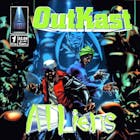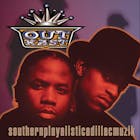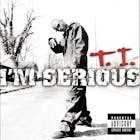
Classic Albums: 'Speakerboxxx/The Love Below' by OutKast
Classic Albums: 'Speakerboxxx/The Love Below' by OutKast
Published Wed, December 31, 1969 at 7:00 PM EST
The success of their fourth album, 2000s Stankonia, put OutKast in a whole new stratosphere, as far as visibility and expectations. They were now the darlings of the music industry, one of the biggest acts in the world. And Atlanta had become the force around which popular music revolved; alongside OutKast, other ATL artists like Usher, Ludacris and Lil Jon were dominating the charts. The spotlight was hotter than ever, and for the more mercurial half of OutKast, the glare was starting to burn.
"Big Boi gets tired of waiting. I get tired of compromising.” - Andre 3000
OutKast, in just under a decade, had seemingly done it all. The duo of Antwon "Big Boi" Patton and Andre "3000" Benjamin had emerged in 1994 as teenage emcees out of Atlanta, representing their city and the soon-to-be-legendary collective known as The Dungeon Family. Their debut album was a platinum-seller, and 'Kast would spend the rest of the 1990s charting a course and setting a standard. They evolved with each subsequent release: going interstellar on 1996s ATLiens; then astrological with Aquemini in 1998. They became one of the most critically-acclaimed acts in rap music; and, having studied at the feet of Atlanta hitmakers Organized Noize, evolved into noteworthy producers in their own right. With the release of their fourth album, 2000s quadruple-platinum Stankonia, and hits like "Ms. Jackson" and "So Fresh, So Clean," Dre and Big Boi became pop superstars, one of the most famous and beloved acts in music.


DROP YOUR EMAIL
TO STAY IN THE KNOW
But OutKast did a funny thing in the aftermath of their Stankonia breakthrough: they decided to work separately. Andre's priorities had shifted; music was beginning to look like a secondary interest, as Dre's acting jones had ballooned into a full-fledged career. He moved to Los Angeles to fully commit to his Hollywood endeavors; and he would make his major motion picture debut in 2003s forgettable Harrison Ford/Josh Hartnett comedy Hollywood Homicide. But music was suddenly becoming a secondary interest, and as Dre's indifference to OutKast became more apparent, Big Boi began throwing himself into his own project.
Big Boi's enthusiasm was understandable. Not only was OutKast bigger than ever, he was one of the most in-demand guest stars in Hip-Hop. In the years since Stankonia, the half of 'Kast known affectionately as Dad-E Fat Sax had delivered standout performances on southern rap classics like YoungBloodz "85," Trick Daddy's "Dro In the Wind" and Killer Mike's "A.D.I.D.A.S." Big Boi was on a hot streak that he didn't want to squelch just because his longtime partner was a little distracted. So a solo album seemed like the only feasible option. And Big Boi welcomed the opportunity to realize his own creative ambitions.
"Just more control on my side—I had a complete vision of what an album could be that was entirely me," he told XXL in 2014. "And the idea was just to keep it funky, keep it jamming, it’s always bass-heavy. And lyricism, it’s all about lyrics, taking pride in your pen and your pad."

I had a complete vision of what an album could be that was entirely me..."
- Big Boi, (XXL interview, 2014)
Big Boi immediately set to work on a project that would balance his pimptastic rap persona with his love for classic gospel, soul and funk sounds. Earth, Wind & Fire and P-Funk would be his most obvious calling cards; alongside the bass music of his youth and the platinum-plated party anthems that were coming out of Atlanta at the time. "I was balancing the studio life and just being a great father," Big recalled of his time recording Speakerboxxx. "I’m proud that I was able to do that and be able to be in my kids’ lives as much as I was, and still am, and raising two beautiful boys who are playing football, and my daughter just went off to Harvard University, so man, I feel like a champ."
As had been traditionally the case, The Dungeon Family would feature heavily into the crafting of Big Boi's new project. Everyone from Killer Mike to Goodie MOB to Sleepy Brown would wind up in the studio with Big Boi; as well as Jazze Pha, Ludacris, and somewhat less-expected collaborators like Patti LaBelle. He would unearth a Jay-Z collaboration for one of the album's most talked-about appearances. "I had done a song called “Poppin’ Tags” with Jay Z, so he had an older verse, so I did “Flip Flop Rock” with him, and everything else was just whoever popped through the studio at the time."
Meanwhile, Dre was suddenly inspired again. He was working on music out in Los Angeles, but it didn't really sound like OutKast. He'd been taking guitar lessons and immersing himself in artists like Prince; and his musings on love and relationships were turning into something of a concept record about affairs of the heart. His acting career off to an inauspicious start (he followed Hollywood Homicide with an appearance on FX's The Shield), music was suddenly calling again. He talked to Big Boi and no one initially knew how to handle the situation: by this point, Big was knee-deep into his own thing; and what Three Stacks was doing didn't really fit.
So a double album was conceived: one disc would be for Big Boi's new project, and the other would be for Dre's.
Dre's new music showed him fully diving into the eclecticism he'd famously displayed across the last two OutKast albums. But he wasn't doing a lot of rapping; something that immediately made this project unlike anything he'd ever done. Andre 3000 had decided to follow-up one of the most successful rap albums of the still-young decade by...singing?
"It’s almost easier to stay as you are when whatever formula you’re doing is working," Dre would say in 2014. "Following our own tastes was exciting but actually went against the formula on the business side. I just think it’s more important to find glory in pushing it. There’s no way to live up to what you’ve done before, so it’s way more fun to go off on another tangent."

It’s almost easier to stay as you are when whatever formula you’re doing is working..."
- Andre 3000 (XXL interview, 2014)
Andre's project would sound unlike anything that OutKast had ever done; but that didn't mean that Big Boi was running in place. What he ultimately crafted would sound like the next logical evolution for the famed duo; a polished, assured collection of musically progressive ATL rap. "That was the feeling I was looking for," Big Boi told The FADER in 2003. "The music was full, it didn't have one specific direction, it wasn't structured [where] you have an intro, you go into a hook, you got another verse, you go into a bridge, and then you out—you could do anything you wanted to. I was looking for funk."
The new OutKast album would be one of the most anticipated projects of 2003, and in late summer, OutKast dropped two singles simultaneously to announce the project. Big Boi's Sleepy Brown-assisted "The Way You Move" and 3000's quirky acoustic "Hey Ya" were entirely different from each other, but the two songs both became the biggest hits in OutKast's storied career. Both songs would ultimately peak at No. 1 on the Billboard Hot 100; with Big Boi's hit becoming a mainstay at family reunions and soul/jazz festivals, as "Hey Ya" turned into a fixture at bar mitzvahs and karaoke bars.
The success of the singles turned OutKast into the biggest act in music, and when it was released in fall 2003, Speakerboxxx/The Love Below was an absolute revelation. Critics praised the broadness of the music, as The Love Below showed Andre to be an effective (if somewhat non-traditional) singer-songwriter, swimming through everything from Around The World In A Day-era Prince to 60s psychedelia. Songs like "Prototype" found him in decidedly whimsical place, as he mused on finding love and the insecurities that can lead us to run away from it.
The fact that 3000 wasn't rapping very much was a point of discussion, but it was lost in the accolades showered on the album. Big Boi's talents as an emcee, however, were now beginning to be more widely recognized. Andre's reputation as a lyricist had vaulted him near the top of rap fans' "greatest" hierarchy, as Big Boi sometimes suffered by comparison. But on Speakerboxxx, Antwon Patton's pen game was immediately undeniable on songs like "Flip Flop Rock" and "Knowing."
"He don't wanna rhyme? Cool, I'll do it for the both of us," Big Boi said in '03. “He don't have to rhyme if he don't want to, 'cause I got this over here."
On an album where the differences between Big and Dre were at their most pronounced; it also became evident what each one seemed to bring to the musical marriage that had been OutKast. But Andre would never again be as comfortable as he'd been before OutKast became megastars. In the wake of Speakerboxxx/The Love Below, OutKast would famously take home the Grammy for Best Album in 2004. And they would set to work on the lukewarm 2006 musical project Idlewild. After that, save for the occasional guest spot, 3000 would slowly become one of music's great reclusive mysteries.
"I believe that Andre was a reluctant superstar," says legendary producer L.A. Reid in Hip Hop: The Songs That Shook America. "He understood everything about it. He understood what it meant musically, what it meant aesthetically, what it meant as a responsible role model. I think he completely understood stardom, but I think he was still a little reluctant to really go."
"And even with his reluctance, he became one of the most important artists ever, right? That's the thing that really moves me," Reid adds.
“I don’t like Hip-Hop these days,” Dré told Rolling Stone in 2004. “There are cool club songs. And there’s nothing wrong with that. But when I loved it, it was great albums. It was you and your homeboy from the neighborhood with a beat machine. They had their own sound. Not one superproducer on one track, another on the next track. I love the Neptunes, but I don’t want that. Our records may not have the best sound, but it’s personal. I wouldn’t trade that for a beat from Dr. Dre.”



I don’t like Hip-Hop these days, there are cool club songs. And there’s nothing wrong with that. But when I loved it, it was great albums. It was you and your homeboy from the neighborhood with a beat machine. They had their own sound. Not one superproducer on one track, another on the next track."
- André 3000 (ROLLING STONE, 2004)
In that same interview, Big Boi shared his partner's sentiments. “I could be getting one beat from Pharrell, another from someone else,” he said. “It’s like picking out a wardrobe. ‘I want a Versace hat, Gucci pants, some Louis Vuitton shoes.’ But I don’t want that. I want my own style." And that commitment to their own voice is what his always made OutKast who they are. Even when the label and everyone around them was uncertain about their ambitious double LP, Big Boi encouraged their circle to stay the course.
“You can ask Dré: From day one, I thought the shit on this record was jamming,” he said in 2004. “Management was getting panicky. They thought the singles were too left. I said, ‘Let’s hold our dicks on this one.’ Like, ‘Don’t budge.'”
“We ain’t budging.”






